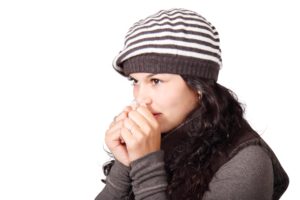January 17, 2017 | Black & Kletz Allergy

It is well known that cold air can cause a runny nose and watery eyes. The runny nose is a result of the vascular constriction caused by the cold air. Non-allergic individuals that have these symptoms may think they have allergies. Allergic individuals that have these symptoms may truly be having these symptoms because of the vascular constriction or because they are at increased exposure to allergens found during the Winters such as dust mites, molds, pet dander and saliva, cockroaches, and rodents. Cold air is also a very well know trigger in many asthmatics and in these patients can cause wheezing, shortness of breath, chest tightness, and/or coughing. Exercising in the cold air is another important trigger for many asthmatics.
During the Winters in the Washington, DC, Northern Virginia, and Maryland metropolitan area, it is common for people to contract a multitude of viruses that cause upper respiratory tract infections. The most common viruses that are responsible for URI’s include the rhinovirus, influenza virus (i.e., flu), parainfluenza virus, coronavirus, respiratory syncytial virus (i.e., RSV), picornavirus, adenovirus, coxsackievirus, and echovirus. URI’s cause many symptoms that are the same as allergic rhinitis symptoms such as nasal congestion, runny nose, sneezing, sinus headaches, clogged ears, cough, and fatigue. In addition, URI’s are known to exacerbate asthma in many asthmatics.
Three other conditions that the cold can cause that can be misconstrued as an allergy include hives (i.e., urticaria), swelling episodes (i.e., angioedema), and generalized itching (i.e., pruritus). These skin conditions can be caused by exposure to cold air or cold water. There a many factors that can cause hives, swelling episodes, and/or itching; some of which include medication allergies, food allergies, certain infectious diseases, autoimmune disorders, and thyroid abnormalities. In the Winter in the Washington, DC metro area, one must also think of the cold weather as a cause of these skin conditions.
The board certified allergists at Black & Kletz Allergy have more than 50 years of experience in diagnosing and treating allergies, asthma, hives, swelling episodes, generalized itching, URI’s (including sinus infections and bronchitis) in both adults and children. Whether they are caused by the cold or caused by other factors, Black & Kletz Allergy has the experience and expertise in treating these conditions. We have offices in Washington, DC, McLean, VA (Tysons Corner, VA), and Manassas, VA and offer on-site parking at all locations. The Washington, DC and McLean, VA offices are Metro accessible and we provide a free shuttle that runs between our McLean, VA office and the Spring Hill metro station on the silver line. To schedule an appointment, please call us or alternatively, you can click Request an Appointment and we will respond within 24 hours by the next business day. Black & Kletz Allergy is proud to provide high quality allergy care to the Washington, DC, Northern Virginia, and Maryland metropolitan area residents in a friendly and professional setting.












